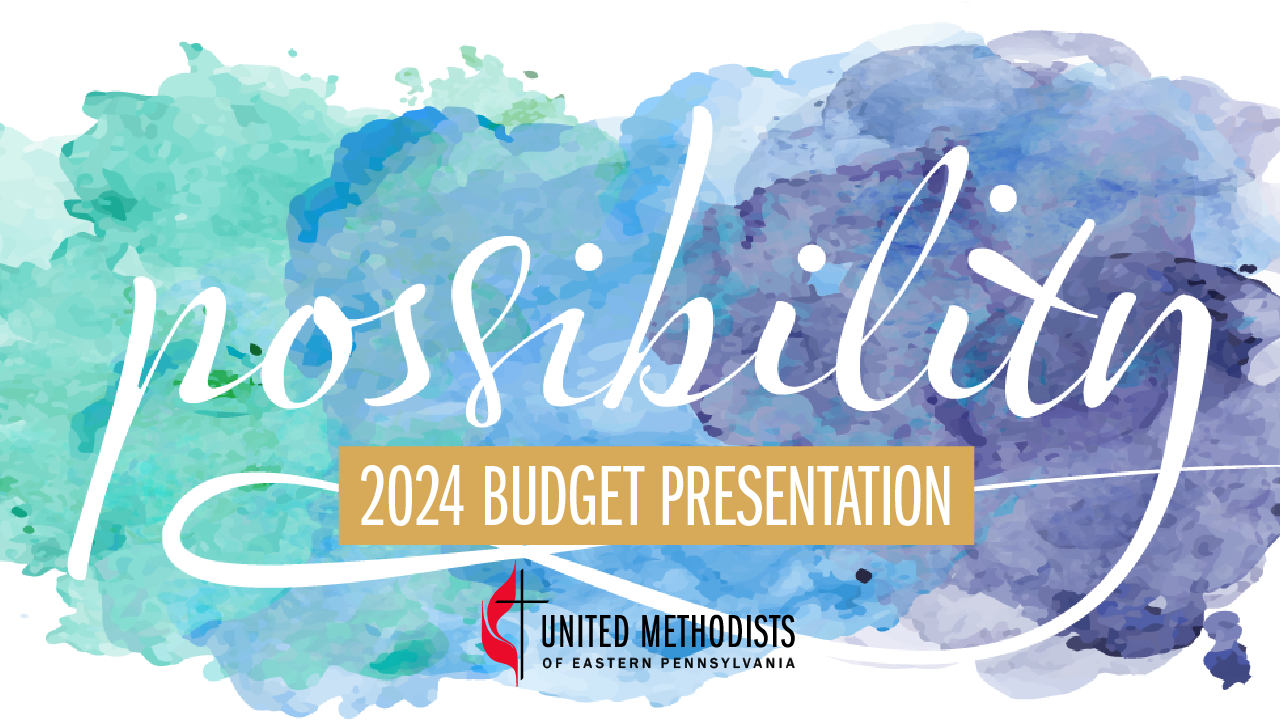
Eastern PA Conference members will convene in an Annual Conference Special Session on Saturday, September 9, at 9:00 a.m., at Lititz United Methodist Church, to vote on the 2024 budget, a fund management policy and other pieces of legislation that were referred to the Special Session.
The revised budget legislation was emailed to conference members August 31. Printed copies will be available at the Special Session, September 9. A series of meetings and listening sessions about the budget have been held to explain the budget, gather input and provide further clarification.
| One final listening session about the revised budget will be held on Wednesday, September 6, at 7:30 p.m., via Zoom, since some members faced technical difficulties during the August 29 and 31 sessions. The zoom link is: https://epaumc.zoom.us/j/82919759399 |
Council on Finance and Administration representatives and Chief Financial Officer/Treasurer NancyJo Fielding have met with the Board of Benefits, Board of Trustees, Camp and Retreat Ministries leaders and Connectional Table to receive their input and consensus. All have supported the budget.
“I am grateful for how each of the agencies have worked together since March of this year,” said Fielding. “Presenting a comprehensive budget for the first time has been important to our financial stewardship and health.”

The 2024 comprehensive budget differs from budgets of previous years in which the annual conference was not receiving and acting on a full EPA budget. A comprehensive budget is being presented because it provides transparency, accountability and follows best practices.
In the past the annual conference only voted on the programmatic aspects of the budget. The Book of Discipline, for good reason, requires a budget for all clergy support, program and benevolences and administration and property. There are three important modifications to the comprehensive budget presentation that differ from the earlier presentation at the May session.
- At the request of several conference members, CFA has added seven additional columns to the budget for leadership development, congregational development, mission and justice, camp and retreats, communications, clergy benefits and trustees. These new columns show the income and cost for each of these ministries.
- The expenses have remained the same except for property because of new information obtained since the May session. On the income side, there are several modifications to address the need for billings.
- The new budget format shows projected uncollectible billings and apportionments based on historic giving in EPA. For billings it is projected that we will not collect $1,065,203. For apportionments the projection is $698,482 for a total of $1.7 million that will not be collected. This means that other congregations are paying for the uncollectibles, so that all clergy health, pensions and congregations property insurance is paid.
“I like that we are using the word ‘comprehensive’ for our budget, it has the word ‘comprehend’ in it,” said CFA member Steve Cherry in an information session offered on Tuesday, August 29. “So, this budget allows members to comprehend the strengths and weaknesses of our conference with full transparency. We get to see the whole thing.”
Indeed, the budget offers a comprehensive look at all amounts billed to congregations and apportioned askings to support Shared— formerly “Connectional”—Ministries of both the conference and the general church, plus funds for conference benevolences, programs, mission and ministry, clergy support, administration and property.
“This new budget format shows the conference just how much we are not collecting and how much local churches who are faithfully paying their remittance bills are bearing the weight of churches who are underpaying or paying zero,” said Fielding. “We are bearing costs that exceed our income, particularly in the billing areas, and that is not sustainable.”
Churches will be apportioned 2.6% of their church spending budgets for general church apportionments and 7.2% for EPA Shared Ministries Apportionments. The latter amount is an increase from 6.9% to help pay our share, $572,265, of The United Methodist Church and BSA (Boy Scouts of America) legal settlement amount to be paid to survivors of past sexual abuse. While the conference will pay its full share upfront, it will apportion the amount to churches over a three-year period.
“We were told that survivors will not be able to receive any of their support monies until the total is paid in full,” Fielding explained. “To ensure that happens as quickly as possible, conferences across the country have agreed to pay their shares in full by the end of the year.”
The new budget reflects salaries and support for four district superintendents, two regional superintending teams and two regional staff to assist congregations in their ministry responsibilities and opportunities. Regional staff will also resource churches involved in urban ministry, leadership development and implementation of the Pathways to Congregational Vitality and Health initiative.
Staff will receive salary increases in 2024, budgeted at 4%, as the conference ends a longtime, unwritten policy of giving 3% raises every other year and begins a new performance review system for giving merit increases, along with cost-of-living adjustments.
The revised budget includes newly acquired, exact figures to replace earlier estimates for Property and Liability, Workers’ Compensation, and other billings from the conference Trustees.
Unchanged from the May budget legislation presented at Annual Conference are several measures, including:
- An 8% administrative fee for shared services, and up to a 1% administrative fee for restricted funds and trusts, to pay for services EPA provides to agencies. That includes, but is not limited to, EPA staff and administrative support, legal support, technology, office space and all other services that must be provided to maintain the programs and operations of specific ministries and activities.
- A provision, according to EPA’s 2022 Path to Wholeness (Journey of Hope) racial/ethnic equity legislation, to reduce Shared Ministry and General Church apportionments for financially and historically disadvantaged congregations, plus provide grants to help pay for their billings. Average community income guidelines will be used to determine the qualification and amount assessed for this support.
- Allocation of conference-designated and donor-restricted funds that follow a new EPA fund management policy. That policy will be consistent with the Book of Discipline, best nonprofit management practices and our goals of preserving and growing capital essential for the conference’s operations and maximizing funds available for mission.
The new fund management policy includes a representative fund committee and an investment committee that will carefully monitor the activity and rates of return on investments, meet with fund managers twice annually, and decide the annual percentage draw on funds.
“We are planning for future ministry by creating a system that grows our funds and uses them to support the work of the conference,” said Fielding, who assumed her new duties in March 2023. She also continues to oversee the clergy and staff Pension and Health Benefits Office. “We are showing that we value our staff by right-sizing work areas and adjusting salaries to be competitive.”
Fielding asked conference members during Sunday’s listening session to consider this challenging time as a “fresh start” for the conference and its Treasurer’s office, as it faces and resolves long-standing problems and launches new policies and procedures to better serve the conference.
“The programs and areas supported through our Shared Ministry funds show that we are still vital, faithful and doing vibrant ministry that is helping to make disciples of Jesus Christ for the transformation of the world,” she said in a later interview. “But it also shows us clearly the areas, around billing specifically, where we need to work to improve our vitality and sustainability to become more financially healthy.”
